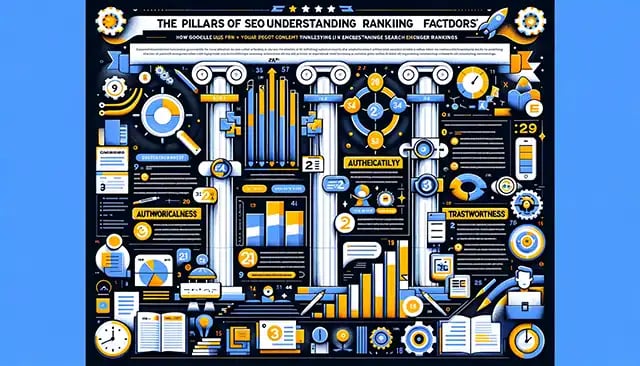Top SEO Ranking Factors: Boost Your Site's Visibility Now
- Home
- Top SEO Ranking Factors: Boost Your Site's Visibility Now
Peeling back the layers of SEO RANKING FACTORS is like unlocking a treasure chest for your website's visibility. Navigating the labyrinth of Google's EEAT criteria illuminates that having decent content isn't enough; it requires material that stands out as authoritative and reliable. You'll get the lowdown on technical SEO must-haves such as mobile-friendliness and lightning-fast loading speeds, both crucial for keeping users happy and engaged. We won't stop there; I'm also pulling back the curtain on optimizing your content with savvy keyword placement and meta magic to make every page hit home in search results. And because no site stands alone, discover how wielding powerful backlinks can elevate your online authority sky-high. Stick around - mastering these factors could be the game-changer your site has been waiting for.
Table Of Contents:
- The Pillars of SEO: Understanding Ranking Factors
- Technical SEO Essentials for Website Optimization
- On-Page SEO Tactics for Content Optimization
- Building Authority Through Backlinks & Internal Links
- Leveraging HubSpot CMS for Enhanced SEO Performance
- User Experience (UX) as a Ranking Factor
- The Role of Social Signals in SEO Rankings
- FAQs about Seo Ranking Factors
- Conclusion

The Pillars of SEO: Understanding Ranking Factors
Google uses over 200 SEO ranking factors to decide which pages top the search results. But, if you think about it, quality content emerges as a champion every time. Why? Because Google's EEAT updates have made sure that only the best and most trustworthy content gets ahead.
Exploring the importance of top-notch content unveils some truly enlightening insights. It’s not just about throwing words on a page; it’s about crafting something that genuinely helps people. Embarking on a thorough exploration of your subject transforms your piece into the ultimate guide that captivates readers' attention. When you nail this, Google notices and rewards you with better visibility.
Importance of Quality Content
Let’s get real—everyone says their content is “high-quality,” but what does that mean? For starters, it should answer users' questions fully and engagingly. If someone lands on your page from a search result but bounces back because they didn’t find what they were looking for, that tells Google your page might not be so relevant after all. This is not simply a question of content length.
Beyond relevance and engagement lies the backbone of great SEO strategy: Core web vitals like expertise, authoritativeness, and trustworthiness (EEAT). With Google's latest updates focusing heavily on EEAT, showcasing real-world experience in your writing has never been more critical.
Google's EEAT Framework
In response to growing concerns over misinformation online, Google rolled out its EEAT framework. In taking this step, Google reaffirmed its dedication to simplifying access to trustworthy content for everyone. This change was monumental—not just any Joe with a blog could rank well anymore without showing genuine knowledge or credibility in their field.
If there’s one takeaway here, it would be this: Your site needs to breathe reliability. Stuffing keywords won't cut it. Nor will thin content or borrowed ideas. Instead, focus on creating something useful, something insightful, and let those hundreds of other ranking signals work in favour of truly outstanding web pages.
Quality content is king in SEO, standing out by being helpful and trustworthy. Dive deep into your topic to create the go-to resource and let Google reward you with better visibility. Genuine expertise matters more than ever.

Technical SEO Essentials for Website Optimization
Elevating your website's presence and enhancing the user journey requires a thorough exploration of the intricate world of technical SEO. It entails honing in on the swiftness of your site, ensuring it's mobile-compatible, and delving into the intricate technicalities that significantly elevate its performance.
Mastering Mobile Usability
In today's world, if your site isn't friendly to a mobile device, you're invisible. With over half of web traffic coming from smartphones and tablets, optimizing for mobile is no longer optional. Remember Mobilegeddon? That was Google telling us loud and clear that sites which play nice with mobile devices get better search rankings.
This doesn't just mean making sure your site fits on a smaller screen. It also involves thinking about how fast it loads there. Slow loading can kill your visitor’s patience faster than they can say "next." Speaking of speed...
The Need for Speed: Loading Times Matter
A second might not seem like much until you wait for a webpage to load. Google has been using site speed in its ranking algorithms since 2010 because nobody likes waiting around.
Faster websites create happier users and lead to better engagement rates—key factors in climbing the ranks in search results. But here's where it gets tricky; improving website speed often requires some behind-the-scenes work on things like image compression or leveraging browser caching.
- Ensure images are optimized without sacrificing quality—it helps pages load quicker.
- Leverage browser caching so returning visitors enjoy faster loading times.
- Cut down on redirects as much as possible—they add unnecessary wait time to page loading speeds.
Tackling these technical aspects may require rolling up your sleeves (or hiring an expert who loves this kind of challenge). In any case, perfecting these nuances is crucial for ensuring swift and seamless access to top-notch content across various devices, satisfying both visitors and search algorithms.
Dive into technical SEO to boost your site's visibility. Focus on speed and mobile-friendliness because slow sites get lost in the shuffle, and if you're not optimized for mobile, you're missing out big time. Remember, faster websites win both users' hearts and higher search rankings.

On-Page SEO Tactics for Content Optimization
Crafting Compelling Title Tags and Meta Descriptions
Imagine your web page is a book. The title tag? Consider the title tag as your book's cover, designed to catch the eyes in a sea of options. Your meta description? It’s the blurb on the back, entices readers to dive in. Together, they're your first pitch to tell Google—and potential visitors—what your page offers.
Title tags should whisper sweet nothings to search engines and users alike, making use of target keywords without stuffing them awkwardly into sentences. Think of it as striking up a conversation rather than shouting across a room. For instance, incorporating "keyword optimization" smoothly can make or break that first impression.
The meta description gives you more space to charm your audience but keep it concise and engaging while slipping in those critical keywords like "meta tags". It's not just about what you say; it's how you say it that could lead someone to click through—or scroll past.
Understanding Keyword Optimization
To get Google’s nod of approval (and better rankings), peppering relevant keywords throughout your content is crucial—but there’s an art to doing so naturally without overdoing it. Imagine keyword optimization as seasoning food: too little and it lacks flavour; too much overwhelms the dish entirely.
Aiming for relevance with every sentence written ensures both search engines and humans easily understand what each webpage offers at its core. Using tools like latent semantic indexing (LSI) helps sprinkle variations of your main keywords organically within the text, providing context clues that help Google understand the content depth. Adopting this strategy not only boosts visibility but also enhances the journey of the user by presenting precisely what was anticipated upon their arrival from a search engine results page.
This balance between readability for people and indexability for search engines defines successful on-page SEO tactics today—especially when updates around E-E-A-T principles demand high-quality, informative pieces above all else. By focusing efforts here, businesses stand better chances at achieving top-tier Google ranks amidst ever-evolving algorithms aimed at connecting users with genuinely useful information.
Think of your title tag as a book cover and your meta description as the enticing blurb on the back. Use them to make a killer first impression, blending keywords smoothly for Google and potential visitors. Mastering keyword optimization is like seasoning food—get it just right to appeal to both search engines and humans, enhancing discoverability while enriching user experience.

Building Authority Through Backlinks & Internal Links
Gaining trust from search engines is like being the popular kid in school. But instead of people whispering about you, it's websites linking to your content. Backlinks, internal linking and the surrounding anchor text serve as your online golden pass, catapulting you to superior positions on the search engine ladder.
Think of each backlink (and each internal link) as a vote of confidence that can impact your search engine ranking. When the Google search engines spot these endorsements, they're like, "Impressive, this website holds water." leading to a notable uptick in how trustworthy your site appears and its position on the search engine ladder. It’s not just any link that counts though; quality matters more than quantity.
The Power of Domain Authority
Not all links are created equal. Links from sites with high domain authority pack a bigger punch than those from lesser-known sources. Imagine getting an endorsement from Oprah versus your next-door neighbour — one carries more weight.
A particularly potent form of endorsement comes from .edu or .gov domains. Because these domains are generally trusted by users and seen as authoritative by Google, links from them can be especially valuable for boosting your website’s rank.
Diving Into High-Quality Backlinks
To snag these powerful backlinks, start by creating top-notch content that others want to reference or share because it provides value or insights into industry-specific topics. A study shows that relevance and quality drive such connections between websites organically over time.
Crafting a strong web of connections with authoritative entities isn't merely advantageous; it's crucial for ascending the search engine ladder and bolstering consumer confidence in your offerings. So yes. Focusing on securing high-quality backlinks should be part of your SEO strategy if standing out among billions of web pages is what you aim for.
Leveraging HubSpot CMS for Enhanced SEO Performance
HubSpot CMS isn't just another platform to build your B2B website on; it's a powerhouse designed to supercharge your SEO efforts, especially in the competitive UK market. With its robust tools tailored for optimization, businesses have seen significant visibility boosts in their B2B searches.
SEO Keywords: HubSpot CMS for SEO
When you think about optimizing your site for improved Google ranking, keywords might be the first thing that pops into your mind. But how do you ensure they're working hard enough? Enter HubSpot CMS. The embedded analytics within it simplify the process of pinpointing the keywords that boost traffic and conversions, thereby streamlining your approach to zero in on effective tactics.
This is not just about throwing in as many relevant words as possible but understanding how these terms can shape content creation (a key Google ranking factor) from start to finish. The goal is clear - get Google to notice you without breaking a sweat (or the rules).
B2B Searches
The stakes are high when it comes down to B2B searches; every click could lead directly back into a business deal or partnership opportunity within the UK market. At this juncture, HubSpot truly excels by providing capabilities such as intricate insights into customer search intent and other Google ranking factors with tailor-made content recommendations driven by search activities—enabling firms to not just ascend the search rankings but also forge stronger bonds with prospective clientele.
Tailoring strategies using this insight means companies can target their ideal demographic much more efficiently, increasing both quality leads and conversion rates.
UK Market Optimization Strategies Using HubSpot CMS
- Utilizing local SEO tactics ensures relevance within specific regions or cities across the UK.
- Focusing on creating valuable content targeted at answering industry-specific questions attracts highly engaged visitors.
- Incorporating social media signals from platforms popular in Britain enhances brand visibility beyond traditional search results.
HubSpot CMS boosts your SEO game by tracking which keywords work, offering insights for smarter content, and providing tools to connect with the UK market. Use it to target better and increase conversions.
%20as%20a%20Ranking%20Factor.webp?width=640&height=366&name=User%20Experience%20(UX)%20as%20a%20Ranking%20Factor.webp)
User Experience (UX) as a Ranking Factor
Imagine walking into a store where everything is easy to find, the layout makes sense, and you can get help whenever you need it. That's what user experience (UX) on your website should feel like for visitors. Google has long emphasized UX because it plays a significant role in website rankings.
A well-designed layout doesn't just look good; it acts like a silent guide for your visitors, leading them from one piece of content to another smoothly. This not only helps keep people on your site longer but also decreases bounce rates—a key stat that Google watches closely when deciding where to rank sites.
Bounce Rate and User-Friendly Layout
The connection between UX and SEO outcomes might seem like magic at first glance, but there's solid reasoning behind it. Websites designed for ease of use often tempt guests to linger and delve deeper into their content. By demonstrating such engagement, it alerts search algorithms to the site's worthiness and pertinence, possibly elevating its position in search results.
But let’s talk numbers—did you know that improving your site architecture could lead directly to higher engagement rates? When users find what they're looking for without frustration or confusion, they're more likely to view multiple pages instead of leaving after hitting just one page (which contributes negatively towards the bounce rate).
To sum up: think about how simple yet effective changes in design can make someone's day better while browsing online—that’s the power of focusing on UX as part of your SEO strategy. Google itself acknowledges this, highlighting how essential aspects such as loading speed play into their evaluation process.
The Role of Social Signals in SEO Rankings
When we talk about boosting your site's visibility on Google, likes and shares on social media might not be the first thing that comes to mind. But guess what? They're like secret agents working behind the scenes. Social signals such as these can subtly influence website ranking, acting as nods of approval from the online community.
Now, let's get something straight: Google has been a bit coy about admitting directly how much these interactions weigh into their algorithms. But, it's clear as a day that a brand's visibility on social media platforms majorly boosts its SEO rankings. It makes sense when you think about it; popular brands tend to rank higher because they are more likely to be talked about online.
A study showed that web pages with high levels of engagement across social platforms often see an uptick in organic traffic. This doesn't mean you should spam your followers with links—Google is too smart for that old trick—but it does suggest a well-crafted social strategy could give your site a leg up.
How Likes and Shares Impact Visibility
Likes and shares act like digital word-of-mouth recommendations—they tell search engines your content resonates with people. As folks interact with your material beyond the boundaries of your site, this engagement signals to search engines that what you're offering is catching on, potentially boosting how often you pop up in searches as time goes by.
To capitalize on this effect, concentrate on crafting posts that are not only engaging but also deliver substantial value or amusement to your audience. Remember, genuine interaction beats quantity every time.
Nurturing Brand Recognition Through Social Media
Your presence on platforms like Facebook or Twitter isn’t just for direct communication anymore—it’s also an extension of your brand identity which plays into how trustworthy Google perceives you to be. This means consistently sharing helpful information and engaging authentically with followers can help establish authority—a key component in improving rankings. Many experts agree that while indirect, the impact is undeniable.
Social signals like likes and shares are undercover SEO heroes, boosting site visibility by signalling content relevance. Crafting share-worthy posts and engaging genuinely on social media can improve your brand's trustworthiness and authority in Google's eyes.
FAQs about Seo Ranking Factors
What are the ranking factors for SEO?
SEO rankings hinge on content quality, backlinks, mobile usability, and page speed. Google loves sites that users find helpful.
How do you rank in SEO?
To climb the SEO ladder, focus on creating top-notch content, snagging solid backlinks, and making your site super user-friendly.
What are the variables determining SEO ranking?
User experience metrics like bounce rate play a big. Also crucial? Keyword relevance in your content and having a secure website.
What are the 3 key ranking factors that Google uses in their algorithm?
The trio at the top? Quality content first; then it's about link authority; lastly comes the user experience factor. Keep these tight.
Conclusion
Peeling back the SEO landscape reveals a world where quality content, technical prowess, and user engagement reign supreme. These foundational elements support your website's standing in the search engine realm.
Dive deep into Google's EEAT to show you're an authority worth listening to. Make sure your site loads at lightning speed on every device. This matters more than ever for staying ahead.
Optimize every page with smart keywords and meta descriptions that speak directly to your audience's needs. Backlinks? They're like gold dust for boosting credibility and climbing those rankings.
Truly understanding SEO isn't merely a checklist affair; it's about crafting narratives that engage, enlighten, and forge connections. Start here, stay focused, and watch as doors open wide to organic traffic like never before.


